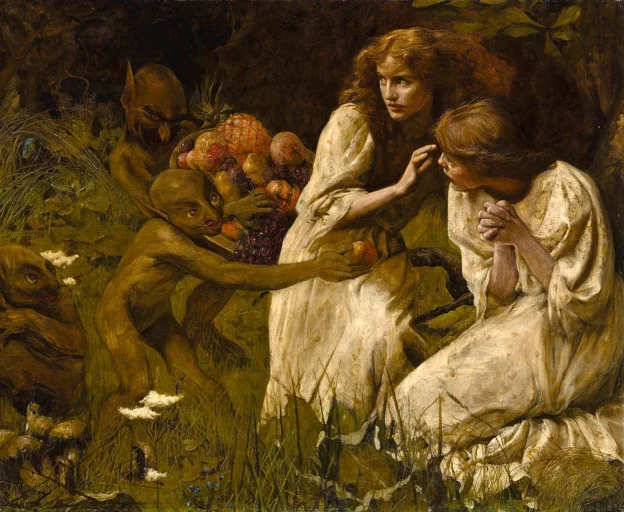Christina Rossetti’s Goblin Market, a richly textured narrative poem, can be interpreted through various critical lenses. One of the most fascinating is the intersectionality between Rossetti’s exploration of temptation, redemption, and duality in Goblin Market, and the philosophy of Cartesian Dualism, a concept popularised by René Descartes. By examining these two seemingly distinct works, a Victorian-era poem and a 17th-century philosophical treatise, we can uncover a deeper discourse on the nature of the body and soul, desire and restraint, and the internal conflicts between mind and body.
Cartesian Dualism: A Brief Overview
René Descartes’ concept of dualism rests on the division between the mind (res cogitans) and the body (res extensa). Descartes argued that the mind, characterised by thought and reason, was distinct from the body, which was material and subject to the physical world. This duality suggests that the mind operates independently of the body’s desires and weaknesses, an idea that has significantly shaped Western philosophical and religious thought.
In this view, the mind as the seat of reason must exert control over the body’s baser impulses and instincts. Descartes’ view of the body as fallible and the mind as transcendent mirrors the religious concept of soul versus flesh, creating a framework for interpreting internal conflict and moral dilemmas.
The Conflict of Mind and Body in Goblin Market
Rossetti’s Goblin Market, on the surface, is a cautionary tale of two sisters, Laura and Lizzie, who encounter goblin merchants selling irresistible, enchanted fruit. The poem is often interpreted as a moral allegory, warning against the dangers of indulgence and temptation. However, it also provides fertile ground for exploring the mind-body duality central to Cartesian philosophy.
Laura’s initial encounter with the goblin fruit can be seen as a moment where her bodily desires, sensory pleasure, hunger, and curiosity, overwhelm her rational mind. She gives in to the allure of the forbidden fruit, despite knowing the dangers, a lapse that evokes Descartes’ warnings about the body’s ability to deceive and lead the mind astray. In this sense, Laura’s succumbing to the goblins is not just a physical act but a symbolic moment where her body triumphs over her mind, reflecting the tension at the heart of Cartesian Dualism.
Lizzie’s Role: Mind Over Matter
Lizzie, in contrast, embodies the Cartesian ideal of mind over matter. She resists the same temptations that ensnared Laura and, more significantly, sacrifices her body to save her sister without allowing her mind to succumb to bodily desires. When Lizzie faces the goblins, they try to force-feed her the fruit, symbolically representing the body’s attempt to dominate the mind. However, Lizzie refuses to eat, maintaining control over her reason and integrity despite the physical onslaught. In this way, Lizzie’s resistance exemplifies Descartes’ view that the mind, when properly aligned with reason and moral purpose, can withstand the body’s corrupting influence.
Desire and Redemption: Navigating the Body-Soul Dichotomy
The narrative of Goblin Market is steeped in sensual imagery that evokes the body’s desires: the luscious fruit, the physicality of the sisters’ interactions, and the overwhelming sense of pleasure and pain that accompanies indulgence and abstinence. Yet, Rossetti also offers a path to redemption, one that aligns with Cartesian thought. Laura is ultimately saved not by indulgence or physical satisfaction but by Lizzie’s stoic refusal to allow her body to dictate her actions.
Rossetti’s depiction of Laura’s redemption, where she partakes in the fruit vicariously through Lizzie, can be viewed as a metaphor for the triumph of the mind and soul over the body. Laura’s salvation does not come from her own willpower but through the intervention of a sister who resists bodily temptations. This can be interpreted as the ultimate expression of Cartesian Dualism, where the mind’s triumph over the body leads to moral and spiritual renewal.
Feminist Reinterpretations and the Body-Mind Connection
It is important to note that Goblin Market is often reinterpreted through feminist and psychoanalytic lenses that critique the duality present in Cartesian thought. While Descartes’ division of mind and body has been foundational, feminist critics argue that this binary hierarchy often devalues the body, which has historically been associated with the feminine, while elevating the mind, traditionally linked to the masculine.
In Goblin Market, the intense physicality of the sisters’ experiences, Laura’s indulgence and Lizzie’s endurance, may also be seen as a reclaiming of the body’s power. Rather than dismissing the body as a corruptive force, Rossetti’s work invites readers to consider the body as integral to experiences of pleasure, pain, and salvation. The sisters’ close bond, their shared suffering, and eventual healing point to a more holistic view of body and mind, challenging Descartes’ rigid dichotomy.
Conclusion
At the intersection of Christina Rossetti’s Goblin Market and René Descartes’ philosophy of dualism lies a rich discourse on the nature of temptation, self-control, and the tension between bodily desires and the mind’s rational authority. Rossetti’s poem offers a nuanced exploration of these themes, showing the consequences of bodily indulgence but also presenting the possibility of redemption through the triumph of the rational mind, as personified by Lizzie.
Yet, Goblin Market also complicates Descartes’ binary, inviting readers to consider the body’s role not as something to be overcome but as a vital component of human experience. In this way, Rossetti’s work stands at the crossroads of philosophy, religion, and feminist thought, offering an enduring exploration of the interplay between mind and body.
